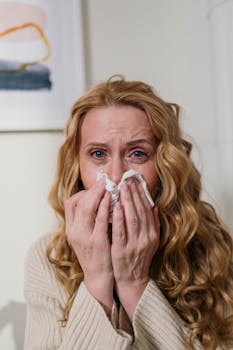
More Allergy, Asthma & Infectious Disease Articles
Permanent Solutions for Allergic Rhinitis Relief

Allergic rhinitis, also known as hay fever, affects millions of people worldwide, causing symptoms such as sneezing, itching, and nasal congestion. Many sufferers are in search of how to cure allergic rhinitis permanently. While a permanent cure remains elusive, there are numerous strategies and treatments available that can significantly alleviate symptoms and improve quality of life.
Understanding Allergic Rhinitis
Allergic rhinitis is an exaggerated immune response to allergens such as pollen, dust mites, or animal dander. When exposed to these allergens, individuals with allergic rhinitis experience inflammation of the nasal passages, leading to discomfort and other symptoms. Understanding the underlying causes and triggers is crucial in managing and possibly reducing the incidence of symptoms.
How to Cure Allergic Rhinitis Permanently
While it’s challenging to claim a permanent cure, several methods may help manage allergic rhinitis effectively. One promising approach is immunotherapy, often referred to as allergy shots. This treatment involves gradually exposing the body to increasing amounts of the allergen, helping to build tolerance and potentially reducing the severity of symptoms over time.
Additionally, lifestyle modifications and environmental control can play a significant role. Removing known allergens from your environment and using air purifiers can minimize exposure. Diet and lifestyle changes, such as maintaining a healthy weight and managing stress, may also support overall immune function.
Complementary Treatments
Several alternative therapies are being studied for their potential benefits in managing allergic rhinitis symptoms. Practices like acupuncture, herbal supplements, and nasal saline irrigation have shown promise for some individuals. It’s important to consult with healthcare professionals when considering supplementary treatments to ensure they are safe and appropriate for your condition.
Explore how a functional medicine approach might help in addressing the root causes of allergic symptoms. A functional medicine perspective focuses on identifying and treating the underlying imbalances in the body, potentially offering more sustainable relief.
Medical Treatments and Management
Prescription medications, such as antihistamines, nasal corticosteroids, and decongestants, are commonly used to manage symptoms. These treatments can provide temporary relief and are often effective when used as directed. However, they do not address the root cause of allergic rhinitis.
In more severe cases, healthcare providers may recommend additional treatments, such as biologic injections or surgery, to manage structural problems in the nasal passages. It is essential for patients to work closely with their healthcare providers to develop a personalized treatment plan.
Lifestyle and Home Remedies
In addition to medical treatments, several home remedies may help reduce allergy symptoms. Keeping windows closed during high pollen seasons, using high-efficiency particulate air (HEPA) filters, and showering after outdoor activities can minimize allergen exposure. Staying hydrated and using a humidifier can also help soothe irritated nasal passages.
Seeking Professional Guidance
It is crucial for individuals experiencing allergic rhinitis to consult healthcare professionals. They can provide guidance on effective treatment options and help tailor strategies to individual needs. For those exploring potential permanent cures, discussing advancements in allergy research and treatment with a healthcare provider can be enlightening.
Conclusion
While a definitive answer to how to cure allergic rhinitis permanently remains in research, a combination of traditional, complementary, and lifestyle approaches can provide meaningful relief. Sufferers are encouraged to pursue comprehensive management plans tailored to their specific conditions.
Remember to consult a healthcare provider for advice tailored to your situation and explore the latest research on allergic rhinitis. For more information on health management techniques, visit this resource.
- Allergic rhinitis is a chronic condition affected by environmental triggers.
- No permanent cure exists, but symptoms can be significantly managed.
- Immunotherapy and lifestyle changes are effective long-term strategies.
- Consult healthcare professionals for a personalized treatment plan.
FAQ
What triggers allergic rhinitis?
Allergic rhinitis is primarily triggered by airborne allergens such as pollen, dust mites, animal dander, and molds. Weather changes and environmental pollutants can also exacerbate symptoms.
Can diet affect allergic rhinitis?
While diet is not a direct cause of allergic rhinitis, maintaining a balanced and nutritious diet may support overall immune health. Avoiding foods that worsen symptoms is also advisable.
Is there a permanent cure for allergic rhinitis?
Currently, there is no known permanent cure for allergic rhinitis. However, treatments like immunotherapy and lifestyle modifications can provide significant relief for many sufferers.
Are there any effective home remedies for allergic rhinitis?
Yes, several home remedies like using saline nasal rinses, keeping indoor air clean with HEPA filters, and minimizing exposure to known allergens can help alleviate symptoms.
When should I see a doctor about allergic rhinitis?
If over-the-counter medications do not relieve symptoms, or if symptoms interfere with daily life, it is important to consult a healthcare provider for a comprehensive evaluation and treatment plan.
Other Articles You May Find of Interest...
- Identifying Common Diseases That Trigger Hives in Adults
- Do Black Ants Bite and What to Do If Bitten by One?
- Recognize the Hidden Dangers: 17 Signs of Mold Illness and Poisoning Symptoms You Shouldn’t Ignore
- Is Pistachio Poisoning Putting Your Health at Risk?
- Permanent Solutions for Allergic Rhinitis Relief
- What Are Basophils and Their Role in Your Blood Test Results?
- Unexpected Lip Bumps: What Causes Them and When to Seek Help














